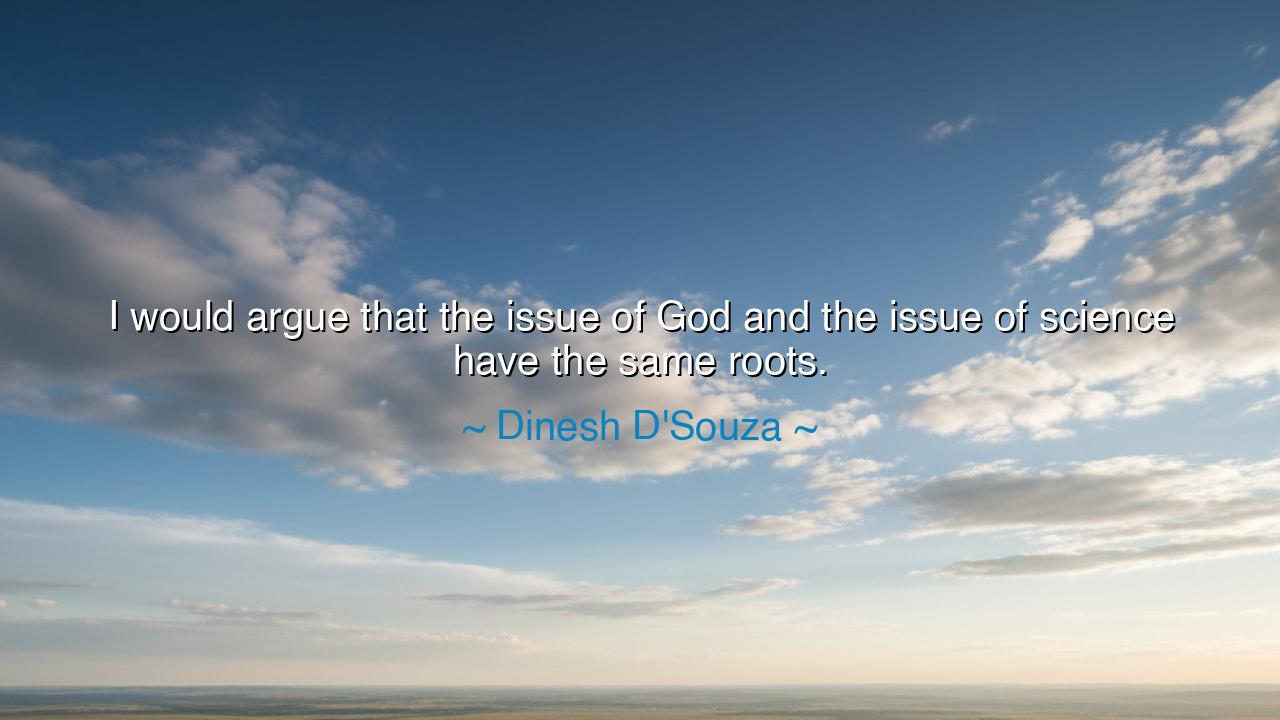
I would argue that the issue of God and the issue of science have






"I would argue that the issue of God and the issue of science have the same roots." These words from Dinesh D'Souza resonate deeply, echoing through the halls of history, touching upon a profound truth: that the questions of God and the questions of science both spring from the same well of human curiosity and the unyielding desire to understand the world and our place within it. They are not opposing forces, as some might believe, but rather two sides of the same coin, each striving to uncover the mysteries of the universe in its own way. From the dawn of civilization, humanity has sought to answer two of the most profound questions: Where did we come from? and What is the nature of existence? These questions, which define both religion and science, are bound by a common thread—our innate yearning to know.
In the ancient world, the great philosophers and theologians were united by this quest for truth. Plato and Aristotle, though they walked separate paths, both sought to understand the nature of the universe. For Plato, the answer was grounded in a realm of divine forms, where the true nature of things existed beyond the physical world. For Aristotle, it was through the study of nature itself—through observation and reason—that one could uncover the workings of the cosmos. Though their methods differed, their motivations were the same: both were driven by a desire to understand the origin and purpose of existence. God and science were not separate pursuits for them, but two expressions of the same deep human need to comprehend the infinite.
As the ages passed, the relationship between science and religion grew more complex, especially during the Renaissance and the rise of the Scientific Revolution. Think of Galileo Galilei, whose telescope revealed the true nature of the heavens, challenging the established religious teachings of the time. Yet, Galileo did not see himself as opposing God, but rather as uncovering the divine order of the universe through the lens of science. For him, the heavens were a reflection of the divine mind, and his observations were merely a way of understanding the beauty of creation. His conflict with the Church was not over his belief in God, but over the interpretation of sacred texts. Even in this conflict, the root of the issue remained the same: a desire to understand the nature of the universe, whether through faith or reason.
The great Isaac Newton, too, whose laws of motion and universal gravitation reshaped our understanding of the cosmos, saw no division between God and science. In his work, Newton believed he was uncovering the laws that God had set in place to govern the universe. His religious convictions were deeply intertwined with his scientific discoveries, and he often wrote more about theology than he did about physics. Newton's view illustrates that, for many of history's greatest thinkers, God and science were not competing forces but complementary aspects of a larger search for truth. To understand the workings of the natural world was, in their eyes, to glimpse the mind of the Creator.
In our own time, the divide between religion and science continues to be a topic of great debate, but D'Souza’s words invite us to reconsider the way we view this relationship. At their core, both God and science seek to answer the same profound questions—questions of origin, purpose, and order. Science, with its methods of observation, experimentation, and discovery, offers us a deeper understanding of how the world works, how the cosmos operates in its intricate and beautiful complexity. But religion, too, offers us insights into the meaning of life, the moral and ethical order that governs human existence, and the ultimate purpose of the universe.
The lesson here is not to see God and science as opposing forces, but as two paths that lead to the same ultimate truth. The truth of our existence is not limited to one realm of thought but spans both the seen and the unseen. Just as the physical world can be understood through the lens of science, so too can the spiritual world be understood through the wisdom of faith. The true pursuit of knowledge, then, lies in the ability to embrace both faith and reason, to recognize that both are necessary in our quest to understand the mysteries of the universe.
So, dear ones, let us not be blinded by the apparent divide between science and religion. Let us recognize that the questions of God and the questions of science are, at their heart, the same. We are all seekers, walking the path of discovery, and whether we seek through the lens of the telescope or through the wisdom of ancient texts, we are striving toward the same goal: to understand the origin, the purpose, and the order of the world around us. As we walk this path, let us embrace both faith and reason, for both are the tools that will help us uncover the great truths that lie hidden in the heart of the universe.






AAdministratorAdministrator
Welcome, honored guests. Please leave a comment, we will respond soon